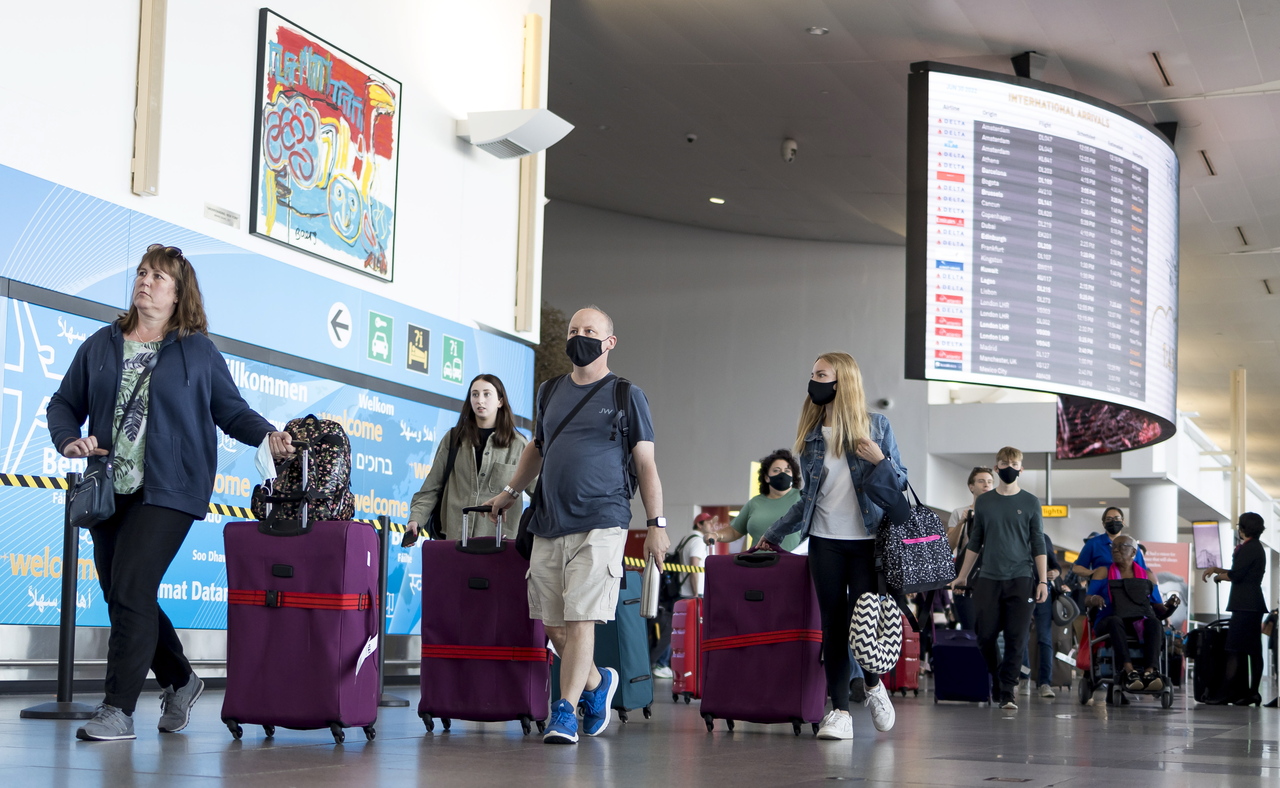US CDC plans to improve international air contact tracing data collection
Sign up now: Get ST's newsletters delivered to your inbox

Major US airlines said they would adopt a voluntary international contact tracing programme on July 8, 2022.
PHOTO: EPA-EFE
Follow topic:
WASHINGTON (REUTERS) - The US Centres for Disease Control and Prevention (CDC) will take steps to improve collection of international air passenger contact information to better monitor public health risks after a report.
Major US airlines on Friday (July 8) said they would adopt a voluntary international contact tracing programme, months after the White House under then-president Donald Trump blocked a mandatory effort found the current data system "needs substantial improvement".
The Government Accountability Office (GAO) on Monday said, "limitations in how CDC collects and manages air passengers' contact information - including CDC's use of an outdated data management system - hinder the agency's ability to monitor public health risks and facilitate contact tracing".
Beginning in November 2021, the CDC required all airlines to collect contact tracing information from all international air passengers.
The report said the CDC's current data management system developed in the mid-2000s "was not designed for rapid assessment or aggregation of public health data" and the CDC "is unable to quickly and accurately identify the number of passengers exposed to a specific infected passenger on a flight".
A CDC spokeswoman said agency director Rochelle Walensky “continues to work with the administration and Congress to improve CDC’s data capabilities.
Reporting data to CDC is vital to the agency’s ability to provide real-world, real-time data to policymakers who must make recommendations and guidance to protect the American public”.
CDC, an agency of the Health and Human Services Department (HHS), told GAO it estimated that between 2015 and 2019 - prior to the coronavirus pandemic - about 80 to 130 distinct flights annually warranted at least one contact investigation "compared to more than an estimated 25,000 distinct flights in 2020" and 17,000 passengers.
GAO recommended CDC redesign or adopt a new data system "to more effectively facilitate contact tracing for all air passengers and conduct disease surveillance for air travel".
HHS said the agency is in initial phases of a "complete redesign" of the reporting system. CDC is also working on a project to improve data interoperability with public health departments to share travel information.
"Given the role that air travel plays in the initial and subsequent spread of communicable disease, CDC and local public health authorities have an acute need to access high-quality passenger contact information," the GAO said.
In February 2021, major US airlines adopted voluntary international contact tracing months after the White House under Trump blocked mandatory collection.
In September 2020, the Trump administration ended enhanced screening of some international passengers for Covid-19 and dropped requirements that travellers coming from targeted countries arrive at 15 designated US airports.
Reuters reported an internal government document found of 675,000 passengers screened at the 15 airports in the CDC effort, fewer than 15 had been identified as having Covid-19.
Airlines for America, a trade group, said in September 2020 it "no longer believes that it makes sense to continue screening at these 15 airports given the extremely low number of passengers identified by the CDC as potentially having a health issues".
Current system flawed
The GAO said the CDC currently uses outdated tools to track and analyse how Covid-19 spreads on planes, hindering the agency's ability to stop outbreaks.
The agency's technological tools were old, slow and prone to problems, the watchdog said.
The "CDC is not positioned to efficiently analyse and disseminate data to inform public health policies and respond to disease threats," the GAO said.
The report comes as the CDC prepares to share findings from an internal review of response to the Covid-19 pandemic that has resulted in more than 1 million American deaths.
Officials inside the CDC and from other parts of the government who work with the agency have raised longstanding frustrations with how the health agency collects and manages data, Bloomberg reported in May.
When tracking air travellers, many data entry tasks are done manually, and it can take the CDC as long as two weeks to collect additional information to address errors or gaps in data provided by airlines, according to the GAO.
By that point, the information is practically obsolete, the GAO said, and the "delay can contribute to broader community spread of a disease, as potentially exposed passengers may become difficult to locate and notify, or they may become symptomatic or infectious during this time".
An "outdated data management system" is to blame for the agency's inability to quickly and accurately identify passengers exposed to an infected person on a flight, according to the GAO.
The GAO recommended that the CDC redesign its system or create a one that would allow broader, more effective surveillance.
To conduct the study, congressional auditors reviewed federal documents, regulations, orders, public health comments and data. They also interviewed officials across the CDC, Customs and Border Protection and the Federal Aviation Administration.

